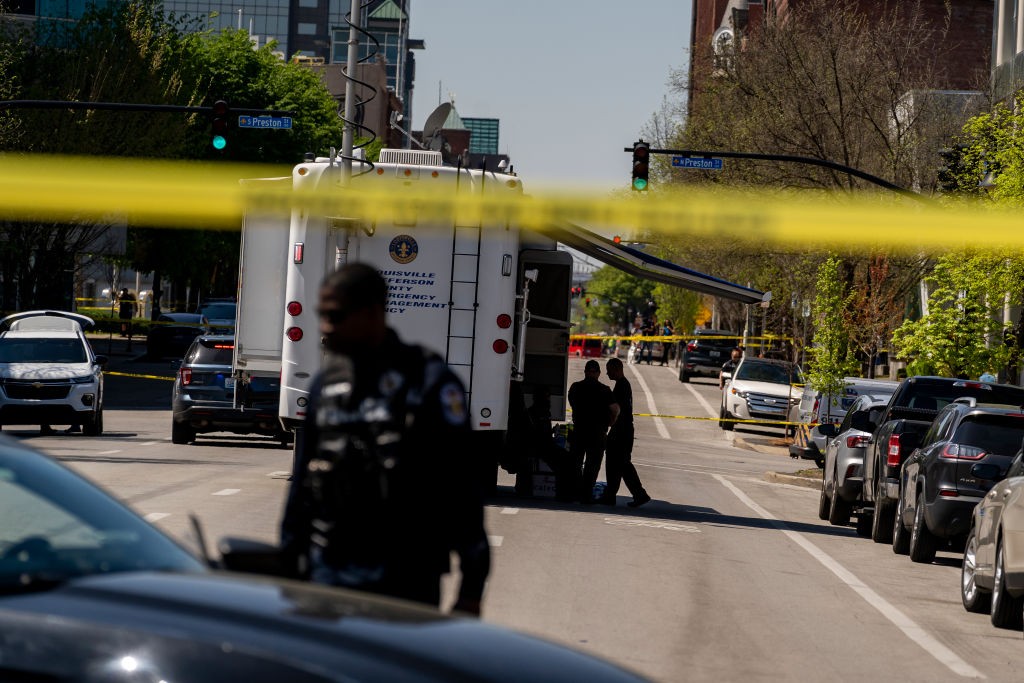I learned nothing at all. The course on dealing with an active shooter (and I do not want to get into the details) was really fuzzy. It basically told you to trust your instincts—is this or that person acting funny or not, what is your gut telling you?—and to increase something called "situational awareness." This is nothing like the training one gets for the operation of a defibrillator. There, you receive only facts. Is the machine automated? Is the person breathing? Is there a pulse? Place self-adhesive electrodes here and there. Instincts do not play a role in that scenario. But this is where we are now. We can't do the rational thing about guns (strongly control or eliminate them entirely), so we are left with something that, in essence, is as mystical as trying to solve the riddle of the future by scrying.
At this moment, a police officer is in "critical but stable condition" after being shot right in the head by an active shooter who, yesterday morning, killed five people and injured at least eight in a Louisville, KY bank. One must assume the officer, fresh out of the police academy, had the best training possible for this very situation. And yet, he will be lucky to leave the hospital with his life.
Officer Nickolas Wilt, a new officer to the LMPD, ran towards the gunfire today to save lives. He remains in critical condition after being shot in the head. pic.twitter.com/yPNZBfAl7I
— LMPD (@LMPD) April 10, 2023
As this mass shooting was happening in Louisville, "officials in Nashville" were considering "sending one of two expelled Democratic lawmakers back to the Tennessee House of Representatives." What was this all about? State representatives Justin Jones and Justin Pearson, both Black, were thrown out of the House last week for participating in a demonstration that demanded nothing more than what most mainstream media regularly calls, and most Americans recognize as, "commonsense gun laws." (Rep. Gloria Johnson, a white woman, also took part in this demonstration but was not expelled from the House—adding tons of salt to injury seems to be a big thing in the South.)
But what we must ask at this point, and what constitutes the substance of this post, is: Why is it so hard for reason (in the enlightenment sense) to prevail in our society? You can throw more guns at a crisis caused by guns (that will do, thank you), but you can't just ban or regulate them? The solution to the riddle of mass shootings does not need even one crystal ball. It's as obvious as the sun rising and falling in the sky, the air flowing in and out of your nose. It's all right there. But instead, we are training people about situational awareness or dynamiting democratic institutions.
The answer was already determined by a group of thinkers that surrounded the young mind of Karl Marx at the end of the first half of the 19th century. You can read about this intellectual climate in Zhang Yibing's exhaustive book Back to Marx: Changes of Philosophical Discourse in the Context of Economics. But it comes down to the determination that capitalist sociality is an inversion of human sociality (or sociobiology). What capitalism does is transfer the innate human ability to cooperate, share ideas with others, and depend on others, from humans to things. And so you (the animal with a large brain, hands, and two feet) become estranged from what is essentially you, from what is of your own making.
The conclusion? Things have a greater value than humans. This is the lesson at the heart of the system we live in. This is why it's so hard for reason (or plain humanism) to prevail. This is why it's so hard to impose even rudimentary gun rules. The things we call guns are, in this inverted social world we were born in (and will most likely die in), more important than humans.
Today, there was mass shooting in Louisville, Kentucky, leaving 5 dead, including a police officer.
— Aaron Parnas (@AaronParnas) April 10, 2023
Remember what Republican Tim Burchett said just recently: “We’re not gonna fix it.” pic.twitter.com/N8QRBFKgLO














